Hospital Employee Shot Dead By Iran’s Security Forces
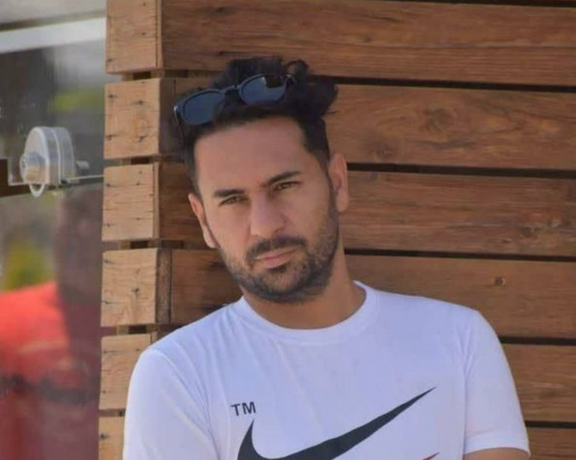
Iranian police shot a hospital emergency response staff member in the head on the road to city of Kashan after they tried to stop his car.

Iranian police shot a hospital emergency response staff member in the head on the road to city of Kashan after they tried to stop his car.
Esmail Dehqani, an employee of the emergency department of Beheshti Hospital in Kashan, was killed July 8 but the news reached the public on Wednesday.
It is not clear why the police wanted to stop his car and under what circumstances. It is also not clear why he did not comply.
Dehqani got married just two months ago and his funeral ceremony was held on Sunday in the presence of many plainclothes security agents.
According to information received by Iran International, immediately after his death, the security and law enforcement authorities of Kashan put pressure on his family to remain silent about the tragic event even four days after his burial.
This is not the only case of indiscriminate killing of citizens by the government agents setting up checkpoints in recent months.
Melika Borji was a 12-year-old child who was shot by police officers in March and died on July 4 after suffering for about four months.
In December, another child was shot dead in her family’s car in Hormozgan Province. Soha Etebari, 12, and her family were on the road to Ahvaz, the capital of Khuzestan Province, when plainclothes security forces started shooting at the car at a checkpoint. Soha died of her injuries on the way to the hospital.
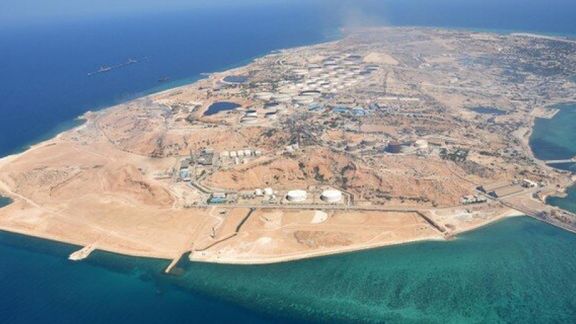
Iran has shown a weak reaction toward its important ally Russia, which this week endorsed a demand by the United Arab Emirates over three Persian Gulf islands.
As Russia joined the Gulf Cooperation Council (GCC) members in support of the United Arab Emirates initiatives to look for “a peaceful settlement” over the ownership of Abu Musa, and the Greater and Lesser Tunb islands Tehran feels deeply annoyed, but it is too weak to show a serious response.
Britain, which maintained control of the three islands it had occupied in the 19th century, withdrew its forces from the Persian Gulf in 1971 and the United Arab Emirates was formed. However, Iran’s Imperial government at the time decided to reclaim what it believed were historical Iranian islands.
Mohammad Reza Shah sent the Iranian navy to secure all three in November of the same year. Iranian forces remain on the islands, with only Abu Musa having much of a civilian population of several thousand.
However, the UAE has maintained over the years that the islands belonged to littoral sheikdoms that joined to form the United Arab Emirates.
A former senior diplomat in Tehran, Qasem Mohebali says countries such as Russia and China believe that no matter what they say or do Tehran will continue to support them over Ukraine, Tibet and Taiwan.
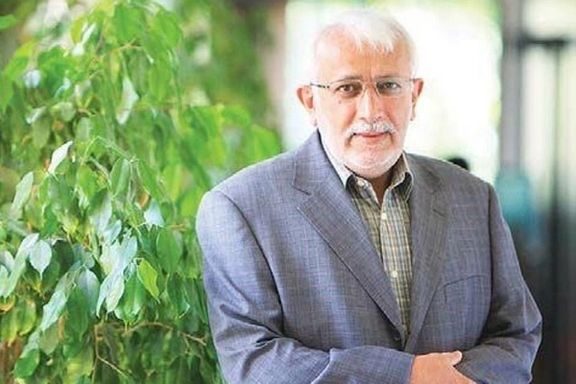
In fact, Iran’s foreign minister Hossein Amir-Abdollahian tweeted Wednesday as an apparent response to Russia, reiterating Iran’s sovereignty on the islands, but shied away from mentioning Russia by name.
Mohebali, who was once the director general of Middle East Affairs at the Iranian Foreign Ministry, also said in an interview with moderate news website Entekhab that "Iran's friends apparently pay more attention to the wishes of its rivals."
He added that the odd stance by Russia is an outcome of Tehran's imbalanced foreign policy. This was a reference to Supreme Leader Ali Khamenei's ‘Looking East’ foreign policy which totally ignores the West and pins all hopes on Russia and China.
Many critics however have pointed out in recent years that Russia is not a trustworthy partner for Iran, neither on the nuclear issue nor in any other foreign policy or trade issue.
Russia joined the GCC on July 11 to support the UAE's demand to refer the case of the three islands to the International Court of Justice based on international laws and the UN charter.
Mohebali also drew attention to a similar move by China in December 2022, during President XI Jinping’s visit to Saudi Arabia. He argued that unlike the United States, Russia and China are not keen to call the waterway The Persian Gulf as Iran does, and they refer to it as "The Gulf" to appease the waterway's littoral Arab countries.
The former diplomat said European states also have supported the Arab states as they pay more attention to the other side's demands rather than to Iran's.
He said because of Iran's imbalanced foreign policy, China and Russia have far more extensive trade relations with the Persian Gulf Arab states than Iran does, and it is natural for them to look after their interests.
Asked how Tehran will respond to Russia's stance on the issue, Mohebali said: "Iran should tell Russia that it might change its position on the Ukraine war and Crimea."
IRGC-linked Tasnim news agency reported quoted Foreign Ministry Spokesman Naser Kanani as rejecting the issues raised in a joint statement of the GCC and Russia about the three Iranian islands in the Persian Gulf. “These islands belong to Iran eternally and issuing such statements run counter to the friendly relations between Iran and the neighbors,” the spokesman noted.
Tasnim added, "The islands of the Greater Tunb, the Lesser Tunb, and Abu Musa have historically been part of Iran, proof of which can be found and corroborated by countless historical, legal, and geographical documents in Iran and other parts of the world."
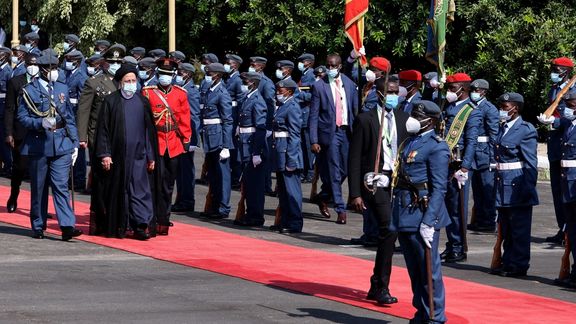
Iranian President Ebrahim Raisi's tour of three African countries is hailed by Tehran as a "new beginning" in relations with the continent.
Raisi received a red-carpet welcome from his Kenyan counterpart William Ruto on Wednesday as he arrived in the country on the first leg of his tour, a first by an Iranian president in more than a decade, presented as an effort to diversify economic ties in the face of crippling US sanctions. The last Iranian leader to visit Africa was Mahmoud Ahmadinejad in 2013.
Kenya's foreign ministry described Raisi’s trip as an opportunity “to review and re-energize bilateral relations for the mutual benefit of the people of the two countries."
According to Kenya’s President Ruto, “Iran agreed to boost Kenya’s pursuits in manufacturing, health and the blue economy through research and technology.” He added that his administration was “working closely with Tehran to facilitate the export of more tea, meat and other agricultural products to Iran, which will also act as a key entry point to Central Asian countries.”
As is customary in Raisi’s visits, Iranian and Kenyan ministers signed five memorandums of understanding covering information technology, fisheries, livestock products and investment promotion, with the Iranian president expressing hope that the bilateral ties would increase tenfold, without specifying a timeframe.
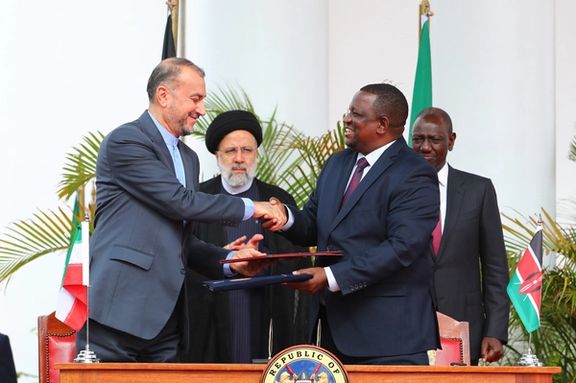
Claiming that raising the volume of trade exchanges 10-fold is within the realm of possibility, Raisi stated, "None of us are satisfied with the current volume of trade and the current economic exchange between countries."
Iran's foreign ministry has said that it expects trade with African countries to increase to more than $2 billion this year, up from an estimated figure of about $500 million.
Even if the higher figure was feasible, it would still be insignificant compared to the UAE's $50 billion and Turkey's $35 billion trade with Africa, which has $600 billion global trade. Iran's target represents less than one percent of that.
Alan Tofighi, a Paris-based activist, told Iran International TV that such claims by Tehran are unrealistic due to its lack of financial resources and international access to invest in African countries.
He believes this is why former president Hassan Rouhani never wasted his time with trips to African countries, as such visits only serve the regime’s propaganda. According to the pundit, Iran’s ulterior motives to have a presence in the continent can be “terrorist activities and procuring materials for its nuclear program, such as uranium, as well as promoting the Shiite ideology.”
The Iranian president arrived at his second destination Uganda later on Wednesday and is scheduled to visit Zimbabwe next.
In Uganda, Raisi signed four agreements with President Yoweri Museveni at his presidential palace in the capital Kampala, also saying that Iran stood ready to share its experience regarding a planned 60,000-barrel-per-day oil refinery.
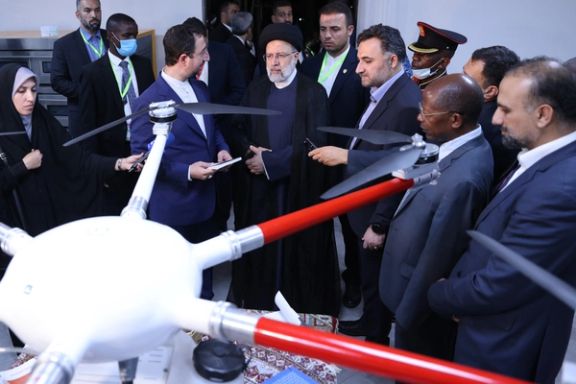
“The West and the global arrogance prefer that countries export oil and raw materials and turn such materials into value-added products. Therefore, all our efforts in Iran are focused on preventing sale of raw materials,” Raisi said.
“Global arrogance” is a term coined by the Islamic Republic to refer to the United States, which it claims wants to subjugate Iran. Anti-Americanism is the ideological cornerstone of Supreme Leader Ali Khamenei's regime during more than three decades of his authoritarian rule.
“Western colonialism is after exerting pressure on free and independent countries through human rights issues and, today, it is exploiting human rights as a political tool and is putting pressure on independent countries through double standards,” Raisi said in a press conference with Museveni.
Morteza Kazemian, another political analyst, told Iran International that Raisi’s visit will bear no results as all the three African destinations of his tour are grappling with numerous economic and social crises. Neither Iran nor these African countries have anything to offer to each other, he added.
Jaber Rajabi, a political analyst and activist, also told us that given the growing isolation of the regime Raisi’s track record of human rights violations related to the mass executions in the 1980s, he does not have many places to visit. “Such trips are only for show,” he noted.
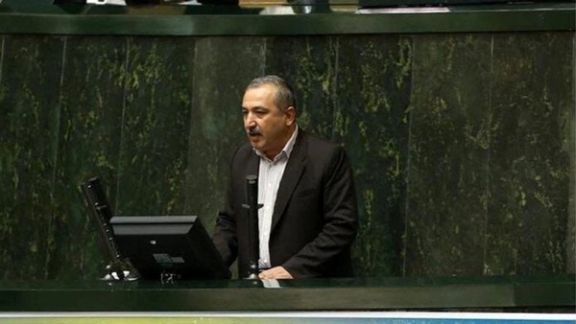
A member of Islamic Republic's parliament has strongly criticized the performance of the government as the economic crisis worsens, with little hope on the horizon.
Jalal Mahmoudzadeh in a tweet on Wednesday slammed the failure of President Ebrahim Raisi and wrote: "We have reached the current situation while the president submitted seven thousand pages of plans during his election campaign.”
He then listed examples of hardships people face, such as " long queues for goods, chicken and bread, multifold increase in prices, and a nearly 100% inflation".
The member of parliament implicitly criticized the Islamic Republic's authorities for attributing many domestic problems to "foreign powers" adding that "If we do not destroy the dignity of our own people, no power outside is capable of doing so."
About two weeks ago, Mahmoudzadeh slammed the loss of 9 million jobs in cyberspace due to restrictions on social networks stating that the incumbent government "looks directly in the eyes of the people and lies".
The most recent official report by the Statistics Center of Iran shows the 'misery index' in eight provinces is above 60% and the rest of the provinces are above 55%.
The misery index is an economic indicator that is obtained by adding the unemployment rate to the inflation rate on an annual basis, and its upsurge also increases the risk of social harm.
Amid the high inflation, social welfare has deteriorated in Iran in the last five years. The official figures show that the misery index has increased from 19.3 in 2016 to 57.7 percent.
The Iranian regime, which is expanding its disputed nuclear program has failed to conclude a new agreement with the West to have US sanctions lifted, which could help reduce economic pressures.
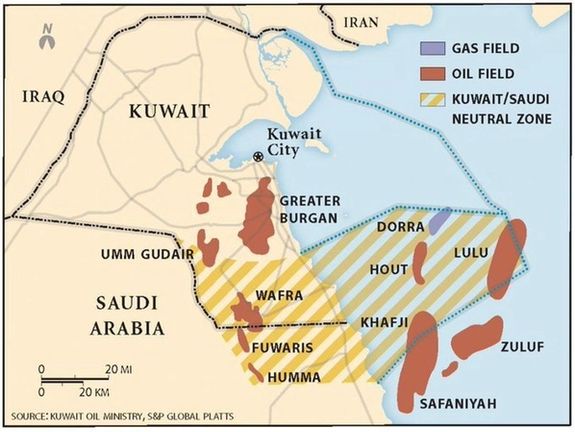
A disputed maritime field in the Persian Gulf is becoming a litmus test for the recent détente between Tehran and Riyadh as controversies surrounding it escalate.
Following weeks of bold remarks by Saudi and Kuwaiti officials insisting on their "exclusive rights" in the offshore field, Iran has shown a subdued reaction.
Oil Minister Javad Owji simply said on Wednesday that the foreign ministry will follow up on the Arash/Durra gas field.
Called Arash in Iran and Durra or Dorra by Saudi Arabia and Kuwait -- the offshore field was discovered in 1967 and is estimated to have a total proven reserves of around 310 million barrels of oil and 20 trillion cubic feet of gas.
Owji's low-key reaction followed comments from Kuwait’s Oil Minister Saad Al Barrak on Sunday who reiterated that Iran has no right over the maritime field located in a divided area, and called on the regime to validate its claim to the field by demarcating its own maritime borders first.
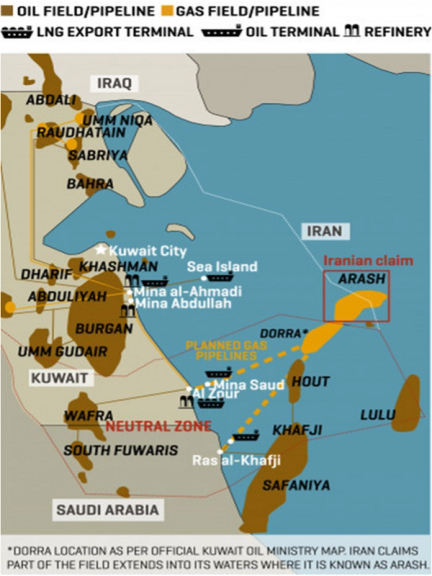
"Until this moment, this is an exclusive right of Kuwait and Saudi Arabia in the Durra field, and whoever has a claim must start demarcating the borders. And if it has a right, it will take it according to the rules of international law," Al Barrak said, adding that "The other side (Iran) has claims that are not based on a clear demarcation of the maritime borders.”
The Islamic Republic, which usually is extremely vocal about claims over its territory, has been mysteriously reluctant to speak out about the renewed claims, with Foreign Ministry spokesman Nasser Kanaani only saying on Tuesday that talks about the country’s maritime demarcation are underway with Kuwait. According to him, the most recent legal and technical talks about maritime boundaries between Iran and Kuwait took place in March.
The reluctance to rebuff the claims follow the recent détente between Tehran and Riyadh, making the regime hesitate to react strongly in fear of ruining the recently resumed ties following a China-brokered deal.
Adding insult to the injury, Iran’s close ally Russia has also sided with Arab states of the Persian Gulf in another contentious issue: the sovereignty over the three Persian Gulf islands of Abu Musa, the Greater and Lesser Tunbs, which the United Arab Emirates claims sovereignty over.
The recent developments have become a double-edged sword as the regime is isolated in the international arena and losing face within the country.
Qasem Mohebbali, a former senior diplomat and head of the Middle East division of the foreign ministry, criticized the regime’s foreign policies as the reason why Iran’s allies are teaming up with its regional rivals.
Mohebbali told Entekhab new website in Tehran last week that in keeping with historic trends, China and Russia care more about their relations with Arab countries than with Iran. “Apparently, Iran's friends do not pay much attention to Iran's demands and pay more attention to the rivals’ [Arab] demands,” he said.
The former diplomat showed how hand-tied the regime is in its current international position by his veiled threats. “It is crucial that Russia knows if it pursues such a policy, Iran can likewise adjust its policies on issues such as Crimea and Ukraine,” he said.
The regime has reacted cautiously. In his tweet about this week’s support from Moscow for the UAE’s claims over the three islands, Iranian Foreign Minister Hossein Abdollahian only said that Iran will not tolerate threats against its “independence, sovereignty and territorial integrity”.
On Monday, Chinese Ambassador to Kuwait Zhang Jianwei said the issue of Arash/Durra gas field should be settled through diplomatic dialogue.
Regime loyalists have criticized the government’s inaction vis-a-vis the project. Chairman of the Board of Directors of the Association of Iranian Oil and Gas Drilling Companies, Hedayatollah Khademi, told ILNA news last month: “It seems that we have surrendered the joint fields to the neighbors.”
Highlighting the fact that Riyadh has significantly developed and extracted from joint fields such as Arash/Durra, Farzad-A, Farzad-B, and Forouzan despite the fact that Iran dug the first exploratory wells in the fields, he said, “We have not done anything," accusing the Iranian government of sitting idle in the face of the encroachment.
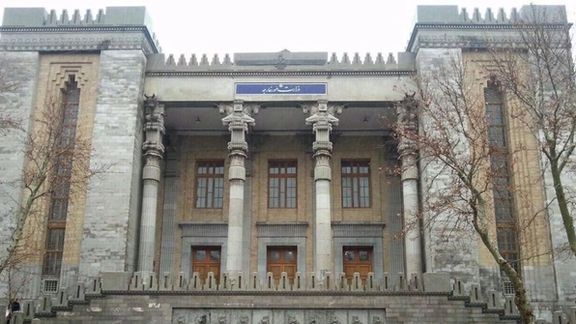
Iran's foreign ministry summoned the Russian envoy to Tehran over Moscow's support for the United Arab Emirates' claim over three Persian Gulf islands.
In a statement issued on Wednesday, the Iranian foreign ministry said Tehran protested Russia's challenging of Iran’s ownership of Greater Tunb, Lesser Tunb, and Abu Musa islands in the Persian Gulf asking Russia to correct its position on the issue.
In a joint Russia-GCC statement at the sixth joint ministerial meeting of the strategic dialogue between the Persian Gulf Cooperation Council (GCC) and the Russian Federation, held in Moscow on Monday, ministers affirmed their support for the United Arab Emirates which, like Iran, claims sovereignty over the islands.
The statement called for "bilateral negotiations or the International Court of Justice, in accordance with the rules of international law and the United Nations Charter, to resolve this issue in accordance with international legitimacy".
Iran's foreign ministry spokesperson Nasser Kanaani, on Tuesday rejected the claims, saying the islands “eternally belong to Iran and such statements are inconsistent with Iran’s friendly relations with its neighbors,” referring to the detente between Iran and its neighbors the UAE and Saudi Arabia.
The three Persian Gulf islands have historically been part of Iran, proof of which can be corroborated by historical and geographical documents. However, the United Arab Emirates has repeatedly laid claim to the islands, describing the situation as “the continued occupation by the Islamic Republic of Iran.”